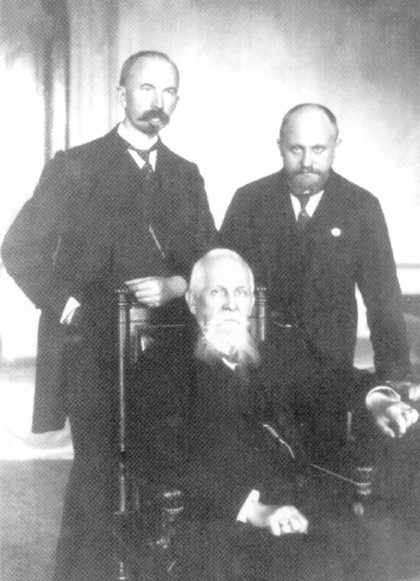Romanchuk, Yuliian
Romanchuk, Yuliian [Романчук, Юліян; Romančuk, Julijan] (Romanczuk, Julian; pseud: U.S. Postupyshyn), b 24 February 1842 in Krylos, Stanyslaviv circle, Galicia, d 22 April 1932 in Lviv. (Photo: Yuliian Romanchuk.) Galician politician, community leader, journalist, scholar, and publisher; full member of the Shevchenko Scientific Society (NTSh) from 1909. He graduated from Lviv University and taught classics at a German gymnasium (1863–8) and at the Ukrainian Academic Gymnasium (1868–1900) in Lviv. He was elected to the Galician Diet (1883–95) and headed its Ruthenian Club (1889–95) and the populist People's Council (1885–99). A leading representative of Western Ukrainian populism, he spearheaded the campaign in the diet for Ukrainian autonomy, gymnasiums, and teachers' seminaries. In 1890 he was one of the architects of the so-called New Era in Austrian, Polish, and Ukrainian political co-operation, but with its failure in 1894 he led the Ukrainian opposition to it. For nearly three decades Romanchuk was a member of the Austrian Reichsrat (1891–7, 1901–18). He headed the Ukrainian Parliamentary Club (1901–10, 1916–17), served as its vice-president from 1910, and in 1905 was the only non-Jewish deputy who spoke in favor of a Jewish curia and equal rights for Jews.
Romanchuk was a founding member and the first leader (1899–1907) of the National Democratic party. During the First World War he was chairman of the Vienna-based Ukrainian Relief Committee and Ukrainian Cultural Council. After Austria's defeat he served in the Ukrainian National Rada (October 1918 to June 1919) of the Western Ukrainian National Republic; on 10 November 1918 he swore in the members of the State Secretariat of the Western Ukrainian National Republic. On 14 March 1923, after the Conference of Ambassadors sanctioned Poland's occupation of Western Ukraine, he presided over the oath of loyalty to Ukrainian statehood, which thousands of Ukrainians took during the rally in Saint George's Cathedral Square in Lviv.
Romanchuk was a distinguished activist in the Galician Ukrainian community. He was a founding member of the Shevchenko Scientific Society, the Prosvita society (president in 1896–1906), the Ridna Shkola society, and the Teachers' Hromada (president in 1912–15) in Lviv and was elected an honorary member of the last three organizations. He contributed to the Lviv periodicals Slovo (Lviv) and thejournal Pravda (which he helped edit in the 1870s); he was the founder (1879), publisher, and actual chief editor (until 1887) of the Lviv populist gazette Bat’kivshchyna; and he cofounded and contributed regularly to Dilo, Lviv's major Ukrainian newspaper from 1880, and Vienna's Ruthenische Revue (1903–5) and Ukrainische Rundschau (1905–14). He edited many Prosvita almanacs and monthly booklets, and from 1871 he compiled Ukrainian readers for elementary and junior high schools in Galicia. He introduced, with Oleksander Barvinsky, the phonetic orthography in schoolbooks in 1890 and in Prosvita publications in 1899. He edited and published in Lviv editions of Taras Shevchenko's selected poetry (2 vols, 1894–5), poetry (1902), works (1907, 1912), and Kobzar (1914), and he wrote several articles on Shevchenko and his poetry, literary criticism, and the brochure Die Ruthenen und ihre Gegner in Galizien (1902). He initiated many Prosvita society publications and founded the library of Ukrainian classics Rus’ka Pys’mennist’, the first 27 volumes of which he edited (1904–20).
Romanchuk actively maintained contact with Ukrainian writers and political and community leaders in Russian-ruled Ukraine. In 1903 he spoke on behalf of Galicia's Ukrainians at the unveiling of Ivan Kotliarevsky's monument in Poltava. As a senior statesman and the de facto leader (together with Yevhen Olesnytsky and Kost Levytsky) of Galicia's Ukrainians in 1900–10, he was widely respected by the Ukrainian public.
Isydor Sokhotsky
[This article originally appeared in the Encyclopedia of Ukraine, vol. 4 (1993).]

